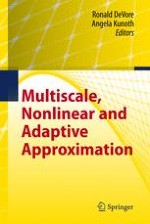2009 | OriginalPaper | Buchkapitel
Theory of adaptive finite element methods: An introduction
verfasst von : Ricardo H. Nochetto, Kunibert G. Siebert, Andreas Veeser
Erschienen in: Multiscale, Nonlinear and Adaptive Approximation
Verlag: Springer Berlin Heidelberg
Aktivieren Sie unsere intelligente Suche, um passende Fachinhalte oder Patente zu finden.
Wählen Sie Textabschnitte aus um mit Künstlicher Intelligenz passenden Patente zu finden. powered by
Markieren Sie Textabschnitte, um KI-gestützt weitere passende Inhalte zu finden. powered by
This is a survey on the theory of adaptive finite element methods (AFEM), which are fundamental in modern computational science and engineering. We present a self-contained and up-to-date discussion of AFEM for linear second order elliptic partial differential equations (PDEs) and dimension
d
>1, with emphasis on the differences and advantages of AFEM over standard FEM. The material is organized in chapters with problems that extend and complement the theory. We start with the functional framework, inf-sup theory, and Petrov-Galerkin method, which are the basis of FEM. We next address four topics of essence in the theory of AFEM that cannot be found in one single article: mesh refinement by bisection, piecewise polynomial approximation in graded meshes, a posteriori error analysis, and convergence and optimal decay rates of AFEM. The first topic is of geometric and combinatorial nature, and describes bisection as a rather simple and efficient technique to create conforming graded meshes with optimal complexity. The second topic explores the potentials of FEM to compensate singular behavior with local resolution and so reach optimal error decay. This theory, although insightful, is insufficient to deal with PDEs since it relies on knowing the exact solution. The third topic provides the missing link, namely a posteriori error estimators, which hinge exclusively on accessible data: we restrict ourselves to the simplest residual-type estimators and present a complete discussion of upper and lower bounds, along with the concept of oscillation and its critical role. The fourth topic refers to the convergence of adaptive loops and its comparison with quasi-uniform refinement. We first show, under rather modest assumptions on the problem class and AFEM, convergence in the natural norm associated to the variational formulation. We next restrict the problem class to coercive symmetric bilinear forms, and show that AFEM is a contraction for a suitable error notion involving the induced energy norm. This property is then instrumental to prove optimal cardinality of AFEM for a class of singular functions, for which the standard FEM is suboptimal.
